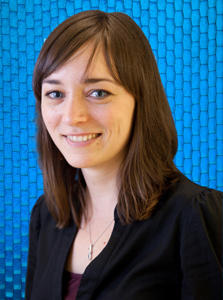 At 34 years old, after just six years as a professional engineer, sustainable design specialist Josephine (Kaiser) Zurica ’03 was named principal of Dagher Engineering. The former Peace Corps volunteer credits her experiences abroad with helping her to develop the leadership skills and ingenuity to foster sustainable solutions.
At 34 years old, after just six years as a professional engineer, sustainable design specialist Josephine (Kaiser) Zurica ’03 was named principal of Dagher Engineering. The former Peace Corps volunteer credits her experiences abroad with helping her to develop the leadership skills and ingenuity to foster sustainable solutions.
The Michigan native arrived at Manhattan in fall 2000 and declared a civil engineering major before Mohammad Naraghi, Ph.D., and Bahman Litkouhi, Ph.D., professors of mechanical engineering, revealed another side of engineering: sustainable design, energy and thermal systems. She quickly changed her major to mechanical engineering and never looked back.
Her lifelong advocacy for social justice also was nurtured at Manhattan. A member of the College’s social justice student organization, Zurica’s conversations with Graham Walker, Ph.D., professor of mechanical engineering, led to the founding of the College’s Engineers Without Borders (EWB) chapter the following year. After graduation, she decided to continue her journey by pursuing a Peace Corps Master’s International degree in environmental engineering from Michigan Technological University.
“Throughout college, I knew I wanted to do something where I could serve and use my knowledge in a practical manner by helping other people,” Zurica says. “Although environmental and mechanical engineering are quite different, my interest in energy efficiency and green technologies paired well with environmental engineering.”
Entry-Level Endeavors
After a year of taking traditional graduate courses in Michigan, Zurica was placed in Panama to serve a small indigenous community as a sanitation and health volunteer. In this role, she provided health education and created water infrastructure and sanitation programs, and taught English and life skills classes to youth. Her biggest challenge in working with the community was motivating them to improve their infrastructure, when as subsistence farmers, they were most focused on life’s immediate needs.
While designing geothermal heating and cooling systems is vastly different from digging latrines in Panama, she credits those experiences as great preparation for her current role.
“It wasn’t your average entry-level job, and it definitely helped me hone my management skills and learn about the construction process for my career,” she says.
At Dagher, a firm that specializes in mechanical, electrical, plumbing (MEP), fire-protection, technology design and consulting, Zurica is more than an MEP engineer — she collaborates in all aspects of the building design process.
Zurica joined the New York City-based firm in 2007 and was quickly promoted to project manager in 2009, specializing in sustainable MEP design at a time when green building science in the U.S. was in its infancy. Her portfolio with the company includes the award-winning net-zero design for the Housatonic River Museum in Pittsfield, Mass., and the historic renovation of the Wave Hill House, a cultural center and garden in Riverdale.
Principal Projects
In her new role as principal, she is maintaining her presence as a project manager while also helping to lead Dagher Engineering’s client relations and marketing strategies. One of the first projects she will finish as principal is an exciting 15-building residential project for Princeton University, which is heated and cooled by a closed loop geothermal system. It’s a golden opportunity to see her schematic design come to life.
“While the closed loop systems require less maintenance and are very energy efficient in the long term, they are generally more expensive to construct and require a 10- to 15-year payback as opposed to the normal five-year expectation,” she explains. “Princeton was interested in the idea of energy efficiency, so they decided to move forward with it. I’m looking forward to monitoring its success.”
Zurica is a LEED (Leadership in Energy and Environmental Design) Accredited Professional in the design and construction phases of green buildings, serving the commercial, residential, education and health-care sectors. On top of her recent promotion, and role as mom to 3-year-old son Franklin, she is in the process of becoming a Certified Passive House Consultant (CPHC), a credential that will distinguish her as an accomplished professional in the passive house concept, which represents today’s highest energy standards, slashing heating energy consumption.
Amazingly, she still finds time to volunteer her professional services with EWB and is currently working with a team to design compost latrines and promote health education in El Salvador.
“It’s been great to work with other engineers from different disciplines in the city, while helping the people of El Salvador,” she adds. “It’s a fun way to use knowledge for good.”